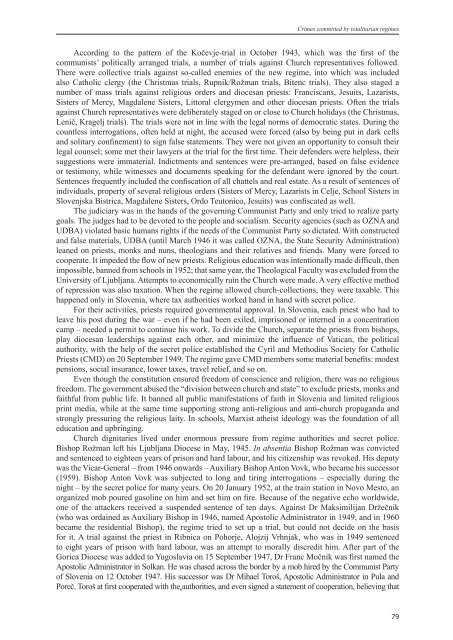crimes committed by totalitarian regimes - Ministrstvo za pravosodje
crimes committed by totalitarian regimes - Ministrstvo za pravosodje
crimes committed by totalitarian regimes - Ministrstvo za pravosodje
Create successful ePaper yourself
Turn your PDF publications into a flip-book with our unique Google optimized e-Paper software.
Crimes <strong>committed</strong> <strong>by</strong> <strong>totalitarian</strong> <strong>regimes</strong><br />
According to the pattern of the Kočevje-trial in October 1943, which was the first of the<br />
communists’ politically arranged trials, a number of trials against Church representatives followed.<br />
There were collective trials against so-called enemies of the new regime, into which was included<br />
also Catholic clergy (the Christmas trials, Rupnik/Rožman trials, Bitenc trials). They also staged a<br />
number of mass trials against religious orders and diocesan priests: Franciscans, Jesuits, La<strong>za</strong>rists,<br />
Sisters of Mercy, Magdalene Sisters, Littoral clergymen and other diocesan priests. Often the trials<br />
against Church representatives were deliberately staged on or close to Church holidays (the Christmas,<br />
Lenič, Kragelj trials). The trials were not in line with the legal norms of democratic states. During the<br />
countless interrogations, often held at night, the accused were forced (also <strong>by</strong> being put in dark cells<br />
and solitary confinement) to sign false statements. They were not given an opportunity to consult their<br />
legal counsel; some met their lawyers at the trial for the first time. Their defenders were helpless, their<br />
suggestions were immaterial. Indictments and sentences were pre-arranged, based on false evidence<br />
or testimony, while witnesses and documents speaking for the defendant were ignored <strong>by</strong> the court.<br />
Sentences frequently included the confiscation of all chattels and real estate. As a result of sentences of<br />
individuals, property of several religious orders (Sisters of Mercy, La<strong>za</strong>rists in Celje, School Sisters in<br />
Slovenjska Bistrica, Magdalene Sisters, Ordo Teutonico, Jesuits) was confiscated as well.<br />
The judiciary was in the hands of the governing Communist Party and only tried to realize party<br />
goals. The judges had to be devoted to the people and socialism. Security agencies (such as OZNA and<br />
UDBA) violated basic humans rights if the needs of the Communist Party so dictated. With constructed<br />
and false materials, UDBA (until March 1946 it was called OZNA, the State Security Administration)<br />
leaned on priests, monks and nuns, theologians and their relatives and friends. Many were forced to<br />
cooperate. It impeded the flow of new priests. Religious education was intentionally made difficult, then<br />
impossible, banned from schools in 1952; that same year, the Theological Faculty was excluded from the<br />
University of Ljubljana. Attempts to economically ruin the Church were made. A very effective method<br />
of repression was also taxation. When the regime allowed church-collections, they were taxable. This<br />
happened only in Slovenia, where tax authorities worked hand in hand with secret police.<br />
For their activities, priests required governmental approval. In Slovenia, each priest who had to<br />
leave his post during the war – even if he had been exiled, imprisoned or interned in a concentration<br />
camp – needed a permit to continue his work. To divide the Church, separate the priests from bishops,<br />
play diocesan leaderships against each other, and minimize the influence of Vatican, the political<br />
authority, with the help of the secret police established the Cyril and Methodius Society for Catholic<br />
Priests (CMD) on 20 September 1949. The regime gave CMD members some material benefits: modest<br />
pensions, social insurance, lower taxes, travel relief, and so on.<br />
Even though the constitution ensured freedom of conscience and religion, there was no religious<br />
freedom. The government abused the “division between church and state” to exclude priests, monks and<br />
faithful from public life. It banned all public manifestations of faith in Slovenia and limited religious<br />
print media, while at the same time supporting strong anti-religious and anti-church propaganda and<br />
strongly pressuring the religious laity. In schools, Marxist atheist ideology was the foundation of all<br />
education and upbringing.<br />
Church dignitaries lived under enormous pressure from regime authorities and secret police.<br />
Bishop Rožman left his Ljubljana Diocese in May, 1945. In absentia Bishop Rožman was convicted<br />
and sentenced to eighteen years of prison and hard labour, and his citizenship was revoked. His deputy<br />
was the Vicar-General – from 1946 onwards – Auxiliary Bishop Anton Vovk, who became his successor<br />
(1959). Bishop Anton Vovk was subjected to long and tiring interrogations – especially during the<br />
night – <strong>by</strong> the secret police for many years. On 20 January 1952, at the train station in Novo Mesto, an<br />
organized mob poured gasoline on him and set him on fire. Because of the negative echo worldwide,<br />
one of the attackers received a suspended sentence of ten days. Against Dr Maksimilijan Držečnik<br />
(who was ordained as Auxiliary Bishop in 1946, named Apostolic Administrator in 1949, and in 1960<br />
became the residential Bishop), the regime tried to set up a trial, but could not decide on the basis<br />
for it. A trial against the priest in Ribnica on Pohorje, Alojzij Vrhnjak, who was in 1949 sentenced<br />
to eight years of prison with hard labour, was an attempt to morally discredit him. After part of the<br />
Gorica Diocese was added to Yugoslavia on 15 September 1947, Dr Franc Močnik was first named the<br />
Apostolic Administrator in Solkan. He was chased across the border <strong>by</strong> a mob hired <strong>by</strong> the Communist Party<br />
of Slovenia on 12 October 1947. His successor was Dr Mihael Toroš, Apostolic Administrator in Pula and<br />
Poreč. Toroš at first cooperated with the authorities, and even signed a statement of cooperation, believing that<br />
79




